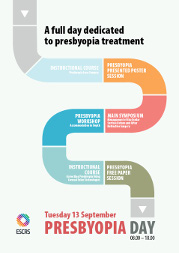Posters
The implementation of closed consolidated medical bills (KEN / Diagnosis Related Groups-DRGs) in ophthalmology field in Greece
Poster Details
First Author: A. Tzamalis GREECE
Co Author(s): N. Chalvatzis I. Tsinopoulos P. Brazitikos S. Dimitrakos M. Talias
Abstract Details
Purpose:
The Closed Consolidated Medical Bills (KEN) is an innovative, for the Greek standards, system of pricing medical services provided by hospital to inpatients during their hospital stay. The implementation is based on the internationally established system of Diagnosis Related Groups - DRGs. The purpose of this study is to evaluate the effects of the new system in the field of Ophthalmology in Greece. Additionally, it attempts to benchmark the system with respective interventions at an international level.
Setting:
2nd Department of Ophthalmology, Aristotle University of Thessaloniki, Papageorgiou General Hospital, Thessaloniki, Greece
Methods:
The study is structured around presentation of the legislative framework of the introduction and implementation of the new system in the Greek healthcare environment, systematic pairing of ophthalmic coding with other coded information regarding registration and management, evaluating data and respective characteristics of similar hospital payment models of other countries by means of an international literature review and analysis of a Greek public hospital example. In a retrospective study, a statistical data analysis is performed related to the cost and associated demographic data from the database of 'Papageorgiou' General Hospital in Thessaloniki,and proposals are formulated to improve the current system.
Results:
A significant difference is noted in the quantitative and qualitative characteristics of the Greek system compared with internationally applied DRG systems in the field of Ophthalmology. The proposed funding for ophthalmic inpatient cases mostly meets real needs and costs of hospitals for supplies, while an important deviation in average length of stay in certain cases is being shown. Complicated cases, mostly in cataract surgery, increase the real cost and cause a deviation. In these cases, the average cost was 673,28 ± 58,7€ as opposed to the average cost of uncomplicated cases, which was 346,78 ± 21,3€, bearing a statistically significant difference (p <0.001, Mann-Whitney test). The assignment of ophthalmic diagnoses with costing codes indicates minor omissions and requires corrective changes.
Conclusions:
The recent introduction of Greek DRGs is a significant attempt to reform the hospital payment system and particularly in ophthalmology departments, the specific nature of which due to their subject specialization leads to difficulty in managing and over-costing. Deviations from the real needs and system failures due to the direct application of the new system are being shown. There is, therefore, an urgent need for amendments aimed at increasing efficiency and improving health services provided by Greek hospitals.
Financial Disclosure:
NONE





